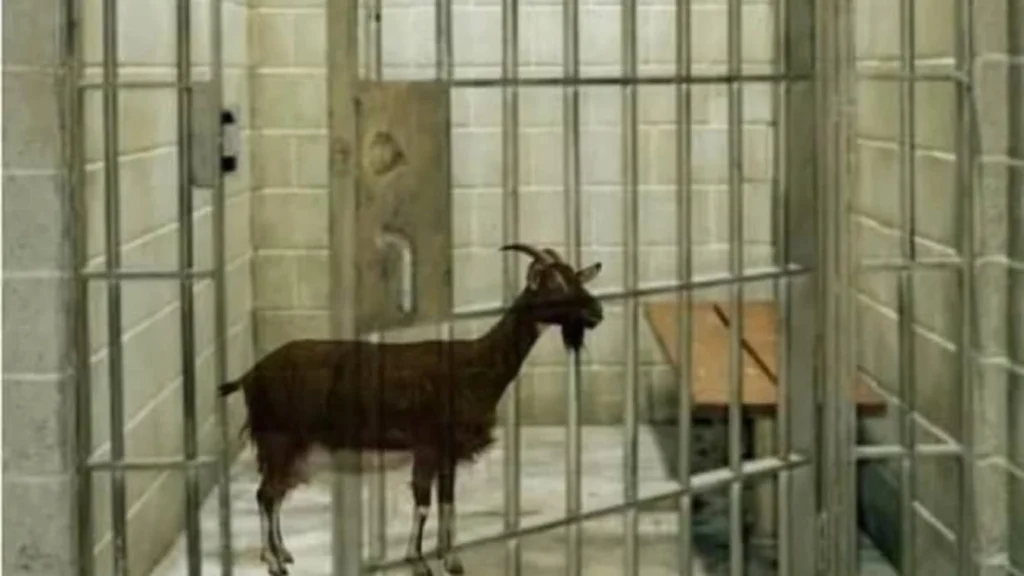
On January 22, 2009, something very unusual happened in Ilorin, a city in Kwara State, Nigeria. It started like many crime stories do—with an attempted car theft. But the story quickly turned into something no one could have expected.
A Robbery Gone Strange
That day, local vigilantes or community watchmen, saw two men trying to steal a Mazda 323. When they tried to stop them, the men ran. One of the suspects got away, but the other didn’t just disappear. According to the vigilantes, he turned into a goat. Yes, a real goat. They said it happened right in front of their eyes. They caught the goat and brought it to the police station as if it were the criminal.
Police spokesperson Tunde Mohammed told reporters, “Vigilante men came to report that while they were on patrol, they saw two hoodlums attempting to rob a car. They pursued them. One escaped, and the other turned into a goat.” The goat was even photographed beside two police officers.
That image was soon everywhere. It went viral online and appeared in Nigerian newspapers. Even news outlets in other countries picked up the strange story.
Beliefs, Magic and Public Reaction
In many Nigerian cultures traditional beliefs are still very strong. Some people believe in shape-shifting, magic, and the power of “juju”—a kind of spiritual force. Because of this, not everyone laughed at the story. Some believed the suspect really had used magic to escape.
One resident in Ilorin told a local journalist, “We see strange things in this country every day. Some people can disappear or change shape when they are in danger.” Even a police officer who didn’t want to be named, said the claim had to be taken seriously because of how many people believed it.
News about the goat spread fast. Nigerian newspapers like Vanguard, The Punch and Nigerian Tribune printed stories and photos of the goat at the station. Crowds came to see it for themselves. Some even prayed or brought offerings, as if the goat really were a person under a spell.
A BBC article quoted, “There are officers who don’t even have a secondary school education, and the police have a big job to do in finding these people and getting rid of them.”
Police Response and the Truth Behind the Story
Soon the Kwara State Police began to feel pressure. Reporters were asking questions. People were laughing or arguing on TV and social media. The police had to explain what really happened.
Police Commissioner Muhtari Ibrahim said clearly, “The police did not and cannot arrest a goat. What happened is that some people brought the goat, saying it was a criminal that turned into an animal. But we are not magicians or witch-hunters; we rely on evidence.”
The police clarified that they never said the goat was a criminal. Instead they only kept it because the vigilantes brought it in and claimed something serious. The goat was treated as “exhibit A” while the police tried to understand the situation.
Tunde Mohammed also told Reuters, “We cannot confirm the story, but the goat is in our custody. We cannot base our information on something mystical. It is something that has to be proved scientifically, that a human being turned into a goat.”
In the end, no charges were filed. The goat was released, and the case did not go to court. But it still became one of the most talked-about stories in Nigeria.
Culture, Law, and the Big Question
The case was more than just strange. It brought up serious questions about how law and traditional beliefs mix in Nigeria. Legal experts said police should not act on things like magic or superstition. A lawyer from Lagos, Mr. Ifeanyi Okonkwo said, “This case, though humorous, raises a fundamental question about law enforcement and the intersection with local traditions. The law requires evidence, not myth.”
Cultural experts also shared their thoughts. They said this event showed how Nigeria is caught between old beliefs and modern ways. While the country has courts and police, many people still believe in magic. And sometimes even police officers believe too.
According to Bossa News, the Nigerian Police later said they wanted to focus more on “evidence-based investigations rather than entertaining mystical explanations.”
Even though the goat is gone and the case is closed, people still remember it. It was a moment when belief, law and modern life clashed in a very public and unforgettable way.


